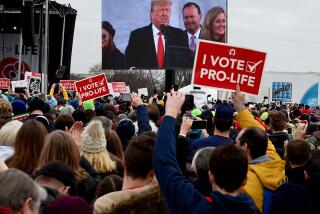Op-Ed: Elizabeth Warren, caught in the electability trap

Are Americans ready for a woman president? The Democratic primaries suggest the answer is “no.” Despite an initial field including four distinguished women, all senators with strong favorability ratings among Democratic voters, the field has already coalesced around two white men in their late 70’s.
There is good reason to assume this outcome results from gender bias. Indeed, research consistently finds that Americans’ views of who should lead are deeply influenced by gender, with people generally viewing men as a better match for leadership than women. This sort of stereotyping shapes perceptions of leadership in companies, schools and families and is likely to extend to views on who should lead the most powerful country in the world.
But the whole truth is more complicated. While there is abundant evidence that women face barriers in American politics, another significant obstacle is convincing voters that their fellow Americans would vote for a woman.
Throughout the primary season, the belief that Americans would not elect a woman president weighed on many Democratic voters. Many were torn between their own preferences and their strong desires to support a candidate who can beat President Trump. Despite their own support for a female candidate, many reported that they were hesitant to vote for a woman because of an underlying anxiety that too many other Americans would be unwilling to also support a woman.
This reasoning creates a self-fulfilling prophecy: If primary voters believe other Americans will not vote for a woman, then they themselves will not vote for a woman, and so a woman will not win. The result is an “electability trap” for the female candidates: The very belief that a woman cannot win has the power to make it true.
There are, however, ways to defeat this trap. Our new study found that when Democratic primary voters learn about women winning in other elections in the U.S. they are then more likely to support a female candidate.
The problem of people underestimating the prevalence of their own views in a broader population is not uncommon. For example, a 1975 study found that white Americans who supported racial integration incorrectly believed their view to be in the minority, when in fact it was the majority view. A 1993 study found that a majority of Princeton University undergraduates reported feeling uncomfortable with levels of binge drinking on campus. But when asked about the views of other students, they wrongly guessed that their peers were comfortable with drinking levels. More recently, various studies have found that Americans greatly underestimate levels of belief in global warming, even when they themselves believe in global warming.
The common thread here is that people’s sense of what is possible often lags behind reality. A nationally representative survey of 2,052 registered voters, conducted by LeanIn.org, found a similar kind of thinking affected the Democratic race.
In the study, 53% of voters said they personally were either “very ready” or “extremely ready” for a female president. Yet those same voters thought that only 16% of Americans would offer a similarly enthusiastic response. Other recent research shows that Americans overestimate other Americans’ opposition to women as well as candidates from other traditionally under-represented groups.
Yet survey studies on the question of electability do not find that voters prefer men, and occasionally have even found that voters prefer women. Analyses of election results generally mirror these surveys, with women performing as well as men in U.S. Congressional races. This is not to say that bias against women in politics is a thing of the past. Women do as well as men in part because only the most qualified women succeed in getting on the ballot.
While research tells us that many voters underestimate Americans’ willingness to vote for women, would Democratic primary voters have been more willing to go with their personal preference for a female candidate if they thought a woman would be considered electable to others?
To answer this question, we conducted an experiment in late February on a sample of about 3,000 likely Democratic primary voters. Participants were randomly assigned to read either a short report summarizing research showing that voters were equally likely to vote for women as for men in U.S. elections or a generic essay about the American electoral process. Compared with participants reading the generic essay, those who read the report on women were significantly more likely to say they would vote for Elizabeth Warren or Amy Klobuchar in their state’s upcoming Democratic primary.
This experiment shows that Democratic voters’ perceptions of women’s electability very likely had an effect on how they cast their ballots. It also shows that educating voters on how women perform as candidates can help address the electability trap.
Many Democratic voters say defeating Trump is a top priority, so their concern with electability is understandable. That’s made this primary season as focused on electoral pragmatics and candidate viability as any in American history. Going forward, Democrats should get out the message that women running for office can win and do win. If Democrats don’t dispel misconceptions about electability they may inadvertently perpetuate the antiquated beliefs that they have fought so hard to defeat.
Robb Willer is a professor of sociology, psychology and organizational behavior at Stanford University. Marianne Cooper is a sociologist at the VMware Women’s Leadership Innovation Lab at Stanford University. Christianne Corbett is a PhD candidate in sociology at Stanford University.
More to Read
A cure for the common opinion
Get thought-provoking perspectives with our weekly newsletter.
You may occasionally receive promotional content from the Los Angeles Times.










